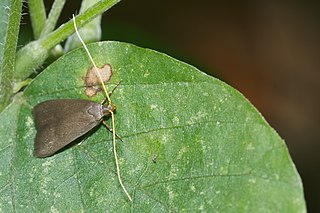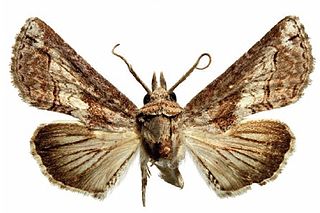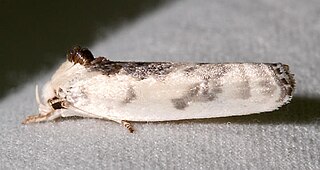
The Blastobasidae are a family of moths in the superfamily Gelechioidea. Its species can be found almost anywhere in the world, though in some places they are not native but introduced by humans. In some arrangements, these moths are included in the case-bearer family (Coleophoridae) as subfamily Blastobasinae. The Symmocidae are sometimes included in the Blastobasidae as subfamily or tribe.

Apantesis is a genus of tiger moths in the family Erebidae first described by Francis Walker in 1855. They are found in North and Central America.
Auximobasis is a genus of the gelechioid moth family Blastobasidae. It is sometimes included in Blastobasis.

The Lecithocerinae are a subfamily of small moths in the family Lecithoceridae. They are found worldwide, but most species occur in South Asia. The subfamily is characterized by the male genitalia with a bridge-like structure connecting the tegumen and the valva, and the uncus almost always is vestigial with two lobes at the dorsal base, only exceptionally united into a broad plate, but never as a thorn or spine.

Asota is a genus of moths in the family Erebidae first described by Jacob Hübner in 1819. Species are widely distributed throughout Africa, India, Sri Lanka, Myanmar, the Malayan region and tropical parts of the Australian region.

Euteliidae is a family of moths in the superfamily Noctuoidea. The family was erected by Augustus Radcliffe Grote in 1882.

Antaeotricha is a genus of moths. It is the largest genus in the subfamily Stenomatinae, numbering over 400 species in the Western Hemisphere.

Izatha is a genus of moths of the family Oecophoridae. They are commonly known as lichen tuft moths. This genus is endemic to New Zealand.

Xyloryctidae is a family of moths contained within the superfamily Gelechioidea described by Edward Meyrick in 1890. Most genera are found in the Indo-Australian region. While many of these moths are tiny, some members of the family grow to a wingspan of up to 66 mm, making them giants among the micromoths.

Cerconota is a genus of moths in the family Depressariidae. In 1991, I. W. B. Nye and David Stephen Fletcher included it in the family Oecophoridae and the subfamily Stenomatinae. It was later placed in the family Elachistidae and subfamily Stenomatinae by Ronald W. Hodges, in Niels Peder Kristensen (1999). Other classifications placed them in the Elachistidae or Oecophoridae, but they actually seem to belong to the Depressariidae.
Auximobasis administra is a moth in the family Blastobasidae. It was described by Edward Meyrick in 1922. It is found in Peru and Colombia.
Auximobasis agrestis is a moth in the family Blastobasidae. It was described by Edward Meyrick in 1922. It is found in Pará, Brazil.
Auximobasis angusta is a moth in the family Blastobasidae. It was described by Edward Meyrick in 1922. It is found in Colombia and Ecuador.
Auximobasis flavida is a moth in the family Blastobasidae. It was described by Edward Meyrick in 1922. It is found in Peru and Pará, Brazil.
Auximobasis prolixa is a moth in the family Blastobasidae. It was described by Edward Meyrick in 1922. It is found in Peru.
Auximobasis incretata is a moth in the family Blastobasidae. It was described by Edward Meyrick in 1931. It is found in Peru.
Auximobasis obstricta is a moth in the family Blastobasidae. It was described by Edward Meyrick in 1918. It is found in Guyana.
Auximobasis flaviciliata is a moth in the family Blastobasidae. It was described by Walsingham in 1897. It is found in the West Indies.
Auximobasis insularis is a moth in the family Blastobasidae. It was described by Lord Walsingham in 1897. It is found in the West Indies.
Auximobasis persimilella is a moth in the family Blastobasidae. It was described by Walsingham in 1891. It is found in the West Indies.








